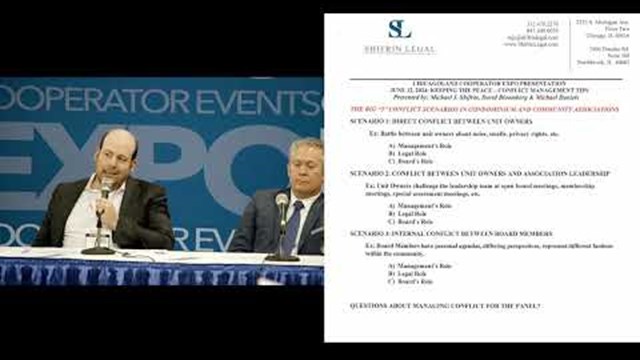Life in a co-op or condo is in many respects a microcosm of the larger world outside. It can suffer from the same factionalism and power struggles as any political entity, only on a much smaller and more intimate—and thus potentially more damaging—scale. Even seemingly minor disagreements can upend a residential community. When such conflict and partisanship in co-op and condo communities infiltrate the board of directors, effective governance of the property can be compromised. Boards and managers therefore must be vigilant in their diplomatic diffusion of issues and the way they handle conflicts in their communities and among themselves. After all, the administration sets the tone for the membership.
With regard to the first, the duty of care, Davidson explains, “Board members must basically understand what’s going on in terms of the building.” Their primary responsibility is to make sure the property is well and effectively managed.
The second duty, the duty of loyalty, “requires adherence to conflict of interest obligations,” says Davidson. In other words, board members must put the building’s or community’s welfare before their own. They should not, for example, award contracts to businesses they own or from which they make money.
In a co-op or condo, though, adherence to this duty is less clearly defined than it is in other not-for-profit organizations, Davidson points out. “The problem,” he continues, “is that co-op boards are very different from other nonprofit boards in that everyone on the board has a personal interest in every issue. This makes them inherently more conflict prone.” For example, a particular board member who votes to permit short-term rentals (like Airbnb) might take advantage of that opportunity and earn extra income from it, while other neighbors might have misgivings about strangers in the building or other potential liabilities.
The duty of obedience, the third duty incumbent upon board members, calls upon them to understand, fairly enforce, and personally abide by the governing documents, policies, and protocols of their community. “The members of the board owe a duty to keep within the powers of the corporation and within those of the board of directors,” explains Davidson. As such, board service in a co-op or condo is not for those who want to write their own rules, or eschew them altogether.
Howard Goldman is a partner with the firm of Goldman and Pease, located in Needham, Massachusetts. He represents numerous condominium associations and says that factionalism happens all too easily when “There is a controlling group on the board, and those not in agreement feel out of control and frustrated. Often, those in these [latter] roles feel disenfranchised and [feel] that no one is listening to them.”
Goldman says there are two potential approaches to getting controlling board members to listen. One is to take a derivative action—a lawsuit brought by a corporation shareholder against the directors, management, and/or other shareholders of the corporation, for a failure to uphold their duty to the corporation as a whole. In the world of condominium ownership, a derivative action can be brought by an individual or group of shareholders to force the board to perform its fiduciary responsibility under the community’s governing documents.
A good example of how and why this approach would be used is when a board of directors doesn’t want to undertake a large and/or expensive project such as extensive roof repairs, but the majority of unit owners want the work done. The derivative action would compel the board to act on the community’s preference, even if it doesn’t align with their own.
Andrew Freedland, an attorney with Anderson Kill, a law firm based in New York City, agrees that there are often factions in co-op and condo boards and buildings. “It’s not unusual for a board to have groups that side one way or another,” he says, but at least they are designed for votes to go one way or the other. “What’s great about most boards is that they are oddly numbered,” continues Freedland, “having five or seven or nine members, avoiding deadlocks on votes.”
The other method of dealing with controlling factions is to remove and replace the offending board members. “If shareholders are unhappy with what a board is doing,” says Freedland, “I have seen recall elections. Shareholders or unit owners can call a special meeting as provided in their bylaws. At that meeting board directors can be removed and replaced.”
Kasten says the same is true in Chicago. Condominium owners can call a meeting of the association and demand to hold new elections. They can air their grievances and hold a vote. If a majority of owners vote to remove the board, a new election is held, and a new board is seated—hopefully one that is more amenable to hearing and acting on different perspectives. Kasten urges that the meeting and elections be held with strict obedience to the association’s bylaws and the state’s condominium statutes; otherwise removed board members could challenge the action, further embroiling the association in conflict.
Freedland says he often gets questions about removing directors from other directors. His response is that “Directors can’t remove other directors from a board. They can only be removed by shareholders. But they can remove a director from a specific position, say president or secretary.” Schlossberg recounts a related situation in which a board president was suspected of dishonest dealing. The rest of the board asked him to step down—but he refused. Since directors can’t be removed from a board by other directors, ultimately, the shareholders had to call a special meeting and they voted to remove the president from the board.
Davidson shares a similar approach. “Identify solutions to each conflict,” he says. “Create rules for decision making. Then survey the board members. How do they view suggested solutions, ranking them from ‘strongly agree’ to ‘strongly disagree’? Produce a summary of the results.” Davidson points out that in his experience, there is often nearly 100% agreement among board members, because solutions are usually pretty simple. “If there are disagreements,” he says, “hold a discussion. And importantly, acknowledge areas of conflict to work toward a common solution. Once you have rules of the road you can manage conflict.”
Freedland sums it up this way: “Dissention shouldn’t permeate every issue. Work it out and get on with it.”
A J Sidransky is a staff writer/reporter with The Chicagoland Cooperator, and a published novelist.
Board Obligations
Michael Davidson is the president of BoardCoach.com, a New York City-based company that specializes in nonprofit board development and management support, including coaching. He explains that board members of nonprofit entities—including co-ops and condos—have three main duties to which they must adhere: “the duty of care, the duty of loyalty, and the duty of obedience.”With regard to the first, the duty of care, Davidson explains, “Board members must basically understand what’s going on in terms of the building.” Their primary responsibility is to make sure the property is well and effectively managed.
The second duty, the duty of loyalty, “requires adherence to conflict of interest obligations,” says Davidson. In other words, board members must put the building’s or community’s welfare before their own. They should not, for example, award contracts to businesses they own or from which they make money.
In a co-op or condo, though, adherence to this duty is less clearly defined than it is in other not-for-profit organizations, Davidson points out. “The problem,” he continues, “is that co-op boards are very different from other nonprofit boards in that everyone on the board has a personal interest in every issue. This makes them inherently more conflict prone.” For example, a particular board member who votes to permit short-term rentals (like Airbnb) might take advantage of that opportunity and earn extra income from it, while other neighbors might have misgivings about strangers in the building or other potential liabilities.
The duty of obedience, the third duty incumbent upon board members, calls upon them to understand, fairly enforce, and personally abide by the governing documents, policies, and protocols of their community. “The members of the board owe a duty to keep within the powers of the corporation and within those of the board of directors,” explains Davidson. As such, board service in a co-op or condo is not for those who want to write their own rules, or eschew them altogether.
Representing a Splintered Board
Kris Kasten, an attorney and principal of Altus Legal, located in Chicago, says factions are common enough in condominium governance. They can become problematic for an attorney representing an association when the factions within a board begin to think that the attorney is choosing a side. “My primary contact is generally with the board president,” says Kasten. “Different factions may think I’m siding with one group or another, but I’m not. My responsibility is to the association. I have to represent them and hear all sides out. I make an effort to speak with everyone on the board. I will ask them if I can speak with them all at once, at the same time.” The opportunities to do so are limited, he laments, but his intention is to open the discussion to everyone so that he doesn’t hear just one perspective.Howard Goldman is a partner with the firm of Goldman and Pease, located in Needham, Massachusetts. He represents numerous condominium associations and says that factionalism happens all too easily when “There is a controlling group on the board, and those not in agreement feel out of control and frustrated. Often, those in these [latter] roles feel disenfranchised and [feel] that no one is listening to them.”
Goldman says there are two potential approaches to getting controlling board members to listen. One is to take a derivative action—a lawsuit brought by a corporation shareholder against the directors, management, and/or other shareholders of the corporation, for a failure to uphold their duty to the corporation as a whole. In the world of condominium ownership, a derivative action can be brought by an individual or group of shareholders to force the board to perform its fiduciary responsibility under the community’s governing documents.
A good example of how and why this approach would be used is when a board of directors doesn’t want to undertake a large and/or expensive project such as extensive roof repairs, but the majority of unit owners want the work done. The derivative action would compel the board to act on the community’s preference, even if it doesn’t align with their own.
Andrew Freedland, an attorney with Anderson Kill, a law firm based in New York City, agrees that there are often factions in co-op and condo boards and buildings. “It’s not unusual for a board to have groups that side one way or another,” he says, but at least they are designed for votes to go one way or the other. “What’s great about most boards is that they are oddly numbered,” continues Freedland, “having five or seven or nine members, avoiding deadlocks on votes.”
The other method of dealing with controlling factions is to remove and replace the offending board members. “If shareholders are unhappy with what a board is doing,” says Freedland, “I have seen recall elections. Shareholders or unit owners can call a special meeting as provided in their bylaws. At that meeting board directors can be removed and replaced.”
Kasten says the same is true in Chicago. Condominium owners can call a meeting of the association and demand to hold new elections. They can air their grievances and hold a vote. If a majority of owners vote to remove the board, a new election is held, and a new board is seated—hopefully one that is more amenable to hearing and acting on different perspectives. Kasten urges that the meeting and elections be held with strict obedience to the association’s bylaws and the state’s condominium statutes; otherwise removed board members could challenge the action, further embroiling the association in conflict.
Real Life Examples
Michele Schlossberg, a property manager with Gumley-Haft in New York, describes a situation where a contingent of shareholders was unhappy with the board’s planning and management of a building system replacement project. They felt that they weren’t being heard by the existing board, so they collected a large number of proxies at the next election and replaced three board members with new directors who might handle the project differently. Instead, the overall effect of the change was to stymie the project further. The new board members wanted to examine every document involved with the project to that point, concluding that they then wanted to start the project over from scratch. The project took five years to complete when it should have taken only a year or two. This was a case of “be careful what you wish for”—the shareholders changed the composition of the board, but at the expense the timely completion of the project.Freedland says he often gets questions about removing directors from other directors. His response is that “Directors can’t remove other directors from a board. They can only be removed by shareholders. But they can remove a director from a specific position, say president or secretary.” Schlossberg recounts a related situation in which a board president was suspected of dishonest dealing. The rest of the board asked him to step down—but he refused. Since directors can’t be removed from a board by other directors, ultimately, the shareholders had to call a special meeting and they voted to remove the president from the board.
What Can a Manager Do?
“Conflict can happen because people just don’t jibe,” says Schlossberg. “They will nitpick each other. When you live in a condo or co-op, you must realize that you live in a community, and when people don’t, it can become contentious.” She suggests that the best way to handle conflicts of this type is to try to arrive at some sort of reconciliation between the two opposing groups, whether that’s in the community as a whole or on the board. “People want to be heard,” she says, and recommends having conversations to understand opposing viewpoints. Taking time at the first board meeting after an election to ask the different factions what they want to see—what kinds of changes they’re looking to effect by joining the board—will go a long way to clearing up conflict and understand what the shareholders want. “The goal is to create a cohesive board,” sums up Schlossberg, and the most important component of achieving that is a commitment to listening and taking others’ concerns seriously.Davidson shares a similar approach. “Identify solutions to each conflict,” he says. “Create rules for decision making. Then survey the board members. How do they view suggested solutions, ranking them from ‘strongly agree’ to ‘strongly disagree’? Produce a summary of the results.” Davidson points out that in his experience, there is often nearly 100% agreement among board members, because solutions are usually pretty simple. “If there are disagreements,” he says, “hold a discussion. And importantly, acknowledge areas of conflict to work toward a common solution. Once you have rules of the road you can manage conflict.”
Freedland sums it up this way: “Dissention shouldn’t permeate every issue. Work it out and get on with it.”
A J Sidransky is a staff writer/reporter with The Chicagoland Cooperator, and a published novelist.










Leave a Comment